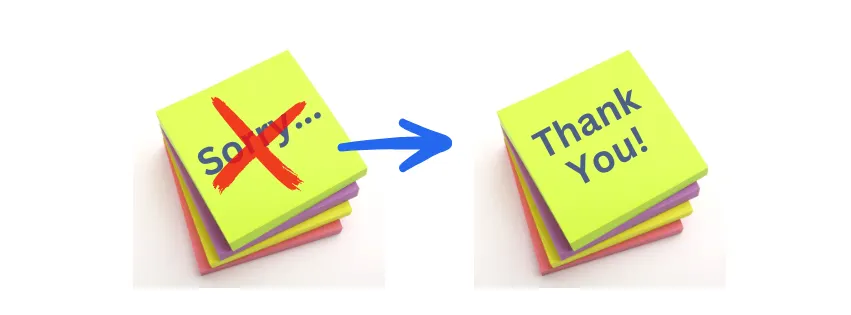Conditioned to Apologise: How Women Learn to Say Sorry for Existing. And How to Change It!

“Sorry, may I just squeeze past you?”
Sound familiar?
How about “Sorry, I’m late” or “Sorry, I didn’t see you there”?
Let’s face it – for many women, apologising isn’t just a reflex; it’s practically a language.
But here’s the thing: why are we always sorry?
The truth is, this "sorry reflex" didn’t appear out of nowhere. It’s been conditioned into us since we were little girls, carefully trained to prioritise politeness and being ‘nice’ over power, confidence, and space.
Somewhere along the way, society whispered to us that our very presence needed to be justified, that bumping into someone or existing too loudly was an inconvenience. And so, we apologise for just... being.
It’s time to unpack this. Where did it come from, and more importantly, how do we stop?
Let’s explore practical ways to stop over-apologising and reclaim our confidence.
Because trust me, swapping “sorry” for “thank you” is not just a shift in language – it’s a declaration of self-worth.
The Subtle Conditioning to Apologise from a Young Age, Especially as a Girl....

Think back to your childhood.
How often were you told to “be polite,” “be nice,” or “not make a fuss”? Whether it was being scolded for interrupting, expected to give up your toy so another child wouldn’t cry, or told to “be quiet” so adults could talk, the message was clear: your job is to make others comfortable, even at your own expense.
This conditioning starts young.
We were taught that being agreeable is virtuous and that taking up too much space or speaking too boldly might label us as ‘bossy,’ ‘rude' or ‘unladylike.’
As an adult, you may even have been called a 'b-i-t-c-h' or, as an even more pointed dismissal, 'emotional', or an 'emotional b-i-t-c-h'.
So, we became fluent in the language of apology to avoid upsetting anyone or seeming impolite.
As adults, this habit sticks.
We say sorry for things that aren’t remotely our fault or even within our control. We apologise for existing in someone’s peripheral space or for inconveniences that others wouldn’t think twice about.
It’s a deeply ingrained reflex – but it’s also one we can unlearn.
Why Over-Apologising Undermines Us

Here’s the sneaky thing about over-apologising: it chips away at our confidence and teaches others how to treat us.
When you say sorry constantly, you’re subtly telling yourself (and the world) that you’re in the wrong or that you need to shrink to make others comfortable.
This undermines your presence and power in situations where you’re perfectly entitled to take up space.
Consider this: would you want your children to grow up apologising every time they needed to speak up, stand up for themselves, or simply exist? Likely not. So why do we model this behaviour ourselves?
The good news is that we can rewrite the script. One of the simplest and most powerful ways is by replacing “sorry” with something else entirely: gratitude.
And yes, I hear you! Gratitude is one of those buzz words that feels like it’s been cooked to well overdone, even burnt...
If you’re up for it though, stay with me and I promise to take it from an overcooked buzz word to making sense.
The Gratitude Shift – Replacing “Sorry” with “Thank You”

Gratitude is a game-changer. It shifts the focus from what you’ve done wrong (even if you haven’t) to what’s been done right.
When you say “thank you” instead of “sorry,” you’re expressing appreciation, not self-blame.
Practical Alternatives to Saying Sorry - here are six easy swaps you can start using today:
1. Instead of “Sorry, I’m late,” say: “Thank you for your patience.”
This acknowledges the other person’s time while maintaining your own dignity.
2. Instead of “Sorry, I didn’t see you,” say: “Thank you for being so understanding.”
Shifting to gratitude feels lighter and avoids unnecessary self-blame.
3. Instead of “Sorry for bothering you,” say: “Thank you for taking the time.”
This shows respect for their time without diminishing your own importance.
4. Instead of “Sorry, can I squeeze past?” say: “Excuse me, thank you!”
You’re simply navigating space – no apology needed.
5. Instead of “Sorry, I made a mistake,” say: “Thank you for catching that. I’ll fix it.”
This keeps the focus on problem-solving rather than self-criticism.
6. My favourite: Instead of “Sorry' for bumping into someone around the corner,” say: “Hello!” with a smile.
It’s disarming, warm, and keeps the moment light and positive.
By making these small changes, you’re not only breaking the habit of over-apologising, you’re also reprogramming yourself to communicate with more confidence and gratitude.
Take Up Space Unapologetically

When you replace “sorry” with “thank you,” you’re not just changing words – you’re reclaiming your space and power.
This isn’t about being rude or dismissive; it’s about recognising that you have just as much right to exist, speak, and move as anyone else.
It’s also about teaching others how to treat you.
When you stop apologising for things that don’t require an apology, you’re setting a precedent: I am confident, capable, and worthy of respect.
And that, my friend, is something worth making a daily practice.
My Challenge to You

Here’s my challenge to you: for one week, notice every time you’re about to say “sorry.”
Ask yourself, “Is an apology really necessary here?”
If not, swap it for “thank you” or another empowering phrase.
You might be surprised by how often you catch yourself.
And over time, you’ll notice how much lighter, more confident, and more present you feel when you stop apologising for simply existing.
⭐🔥⭐🔥⭐🔥⭐ Because you, my friend, have nothing to apologise for. Let’s take up space, unapologetically ⭐🔥⭐🔥⭐🔥⭐
P.s. A fun addition I use when helping other women to notice how often they say sorry is to pull out my imaginary 'sorry jar'
A note with this - before I do use my jar, I let them know I understand how conditioned we are to say sorry and the next time I hear them say it, I'll be pulling out my sorry jar and they'll have to put their imaginary money in it
This keeps it light as opposed to something we're doing 'wrong'
